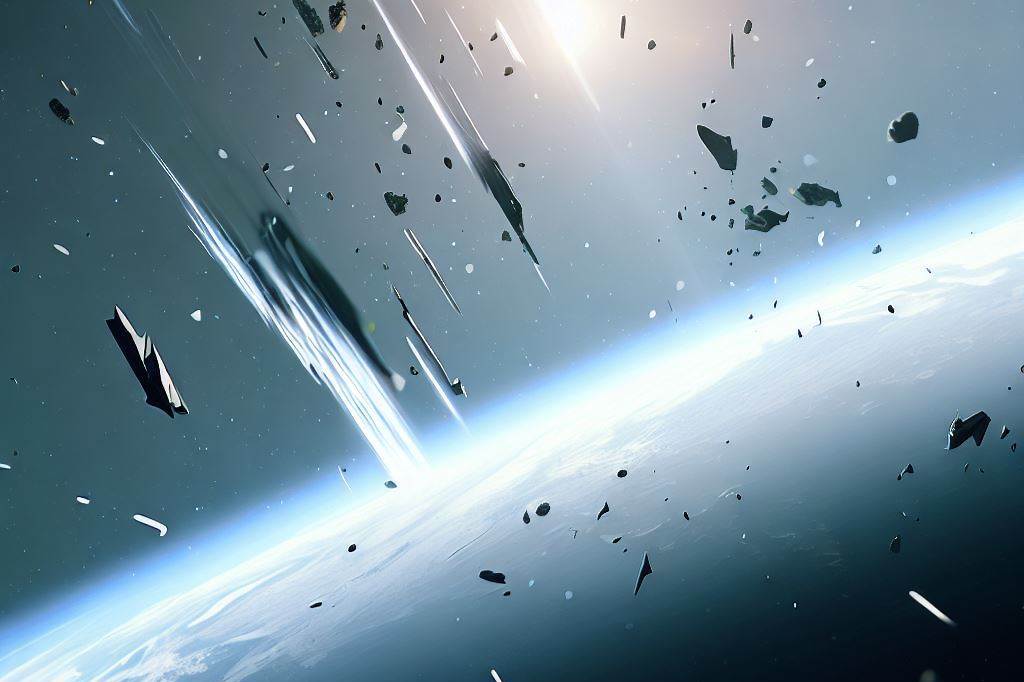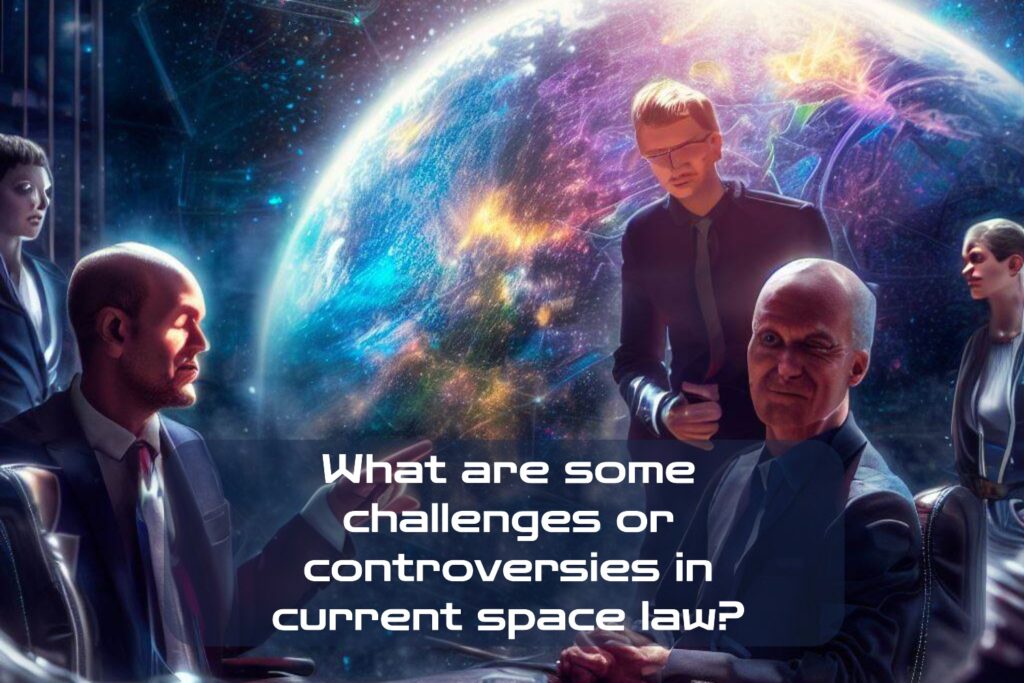The Importance and Challenges of Space Law
Space law is a set of international treaties, agreements, and rules that regulate human activities in outer space. It covers a wide range of issues such as the peaceful use of space, space exploration, commercial exploitation of resources from celestial bodies, liability for damages caused by space objects, and many more.
The importance of space law cannot be overstated since it provides a framework for cooperation among nations to ensure that the benefits and risks associated with outer space are shared in a fair and equitable manner. Despite its significance, there are several challenges and controversies in current space law.
These issues reflect the changing nature of human activities in outer space as well as the evolving geopolitical landscape on Earth. Let’s examine some of these challenges.
Outer Space Property Rights

One area where there is a lack of clarity is property rights in outer space. The Outer Space Treaty, signed in 1967 prohibits any government from claiming ownership over celestial bodies but does not explicitly prohibit private ownership or exploitation. Recently, some private companies such as SpaceX have expressed interest in extracting resources such as water or minerals from the moon or asteroids.
However, this raises several legal questions:
- Who owns those resources?
- Can private companies claim ownership over them?
- Will they be able to sell them on Earth?
There is currently no consensus among nations on how to handle this issue which has led to calls for new international agreements or amendments to existing ones.
Liability for Damages Caused by Space Debris
Another challenge facing policymakers is how to deal with the growing problem of space debris. According to NASA (PDF), there are currently over 500,000 pieces of debris orbiting Earth at speeds up to 17,500 miles per hour which poses a significant risk to satellites and spacecraft. The question then becomes: who is liable if these objects cause damage?
The liability framework for space debris is complex since it involves multiple actors, such as governments, private companies, and even individuals. There is currently no international agreement on how to allocate responsibility for cleanup or compensation for damages, which has led to calls for more robust legal frameworks.
Regulation of Commercial Activities in Outer Space
The increasing involvement of private companies in space exploration and exploitation presents another challenge to policymakers. While commercial activities have the potential to accelerate technological development and increase economic growth, they also pose potential risks such as environmental damage or safety hazards. Furthermore, there is currently no consensus on how to regulate these activities.
Some argue that existing international agreements are sufficient, while others call for new regulations that take into account the unique challenges of commercial activities in outer space. As more private companies launch into space, this issue will become increasingly relevant and require careful consideration from policymakers.
The Gray Area of Property Rights in Outer Space
When it comes to property rights in outer space, things get a bit complicated. The Outer Space Treaty of 1967 established that no country can claim ownership of any celestial body, but it is unclear whether this extends to private entities.
This creates a gray area wherein companies do have the legal right to extract resources from celestial bodies but don’t necessarily have the legal right to own them. Recently, there has been much debate over whether private companies should be able to own and profit from resources extracted from celestial bodies.
Companies such as SpaceX and Blue Origin argue that they are investing time, money, and technology into mining these resources and should be able to benefit from them. However, critics worry that allowing private companies to own extraterrestrial resources could lead to exploitation and exacerbate economic inequality on Earth.
The issue becomes even more complicated when considering international partnerships and collaborations in space exploration.
Can multiple countries or entities share ownership of a resource?
Is it fair for a single company or country to profit off something that belongs to all humanity?
These are questions that need answers as we continue exploring beyond our planet.
The Growing Problem of Space Debris

In recent years, the number of objects orbiting Earth has increased dramatically. Unfortunately, many of these objects are man-made debris, or space junk, that pose a significant risk to human activities in space. From defunct satellites to rocket fragments and discarded tools, space debris can cause serious damage if it collides with a spacecraft or an astronaut during a mission.
In fact, NASA estimates that there are over 500,000 pieces of debris larger than a marble currently orbiting Earth, and even tiny flecks of paint can cause damage when they travel at high speeds. As more countries launch satellites and conduct space missions, the problem of space debris is likely to worsen.
The Legal Framework for Liability and Compensation

Who is responsible for the damage caused by space debris? The answer is not straightforward. According to Article VII of the Outer Space Treaty (OST), states are liable for damages caused by their activities in outer space.
However, the treaty does not specify how liability should be determined or how compensation should be provided. In addition, private companies are increasingly involved in space activities and may face different legal obligations than states.
To address these issues, several international agreements have been developed over the years. The Liability Convention (1967) establishes a framework for determining liability and compensation in cases of damage or loss caused by space objects.
The Registration Convention (1975) requires states to register their space objects and provide information about their orbits to facilitate coordination and avoid collisions. The Space Debris Mitigation Guidelines (2007/PDF) provide recommendations on best practices for minimizing the creation and impact of space debris.
A Complex Issue
Despite these efforts, there are still many challenges related to liability and compensation for damages caused by space debris. For example, it can be difficult to determine who is responsible when multiple parties contribute to an object’s creation or launch, or when the cause of damage is unclear.
In addition, compensation can be difficult to calculate, especially when intangible losses such as reputation or research opportunities are involved. Moreover, some experts argue that the existing legal framework may not be sufficient to address the growing problem of space debris.
For instance, some have proposed establishing a clear mechanism for removing debris from orbit and a fund to compensate victims of space debris incidents. Others suggest that the issue should be addressed through voluntary measures such as industry standards and best practices.
As space activities continue to expand and evolve, it is likely that liability and compensation for damages caused by space debris will remain a complex issue. However, by continuing to collaborate and innovate across borders and sectors, stakeholders can work towards ensuring safe and sustainable use of outer space for all.
Regulation of commercial activities in outer space

The rise of private companies in space exploration and exploitation
In recent years, there has been a significant increase in the involvement of private companies in the world of space exploration and exploitation. Companies such as SpaceX, Blue Origin, and Virgin Galactic have made headlines for their ambitious projects aimed at taking humans beyond Earth’s atmosphere and even establishing a permanent human presence on other celestial bodies. This trend towards privatization brings with it both benefits and challenges.
On one hand, it allows for increased innovation, efficiency, and competition in the development of new technologies and space missions. On the other hand, it also raises concerns about safety standards, environmental impact, and ethical considerations.
The need for clear regulations to ensure safety, sustainability, and fair competition
As these commercial activities continue to grow in scale and complexity, there is an urgent need for clear regulations to ensure that they are conducted safely, sustainably, and with fair competition.
One major challenge is determining how to balance the interests of private companies with those of governments which have traditionally played a dominant role in the governance of outer space. Some experts argue that existing international treaties, such as the Outer Space Treaty, are outdated or inadequate when it comes to regulating private activities in space.
In response to this challenge, some countries are exploring new domestic legislation specifically designed to address commercial activities in outer space. For example, the United States recently passed a law that grants greater flexibility to private companies while also establishing new requirements for safety standards and licensing procedures.
The future of commercial activity in outer space
Looking ahead to the future of commercial activity in outer space raises many exciting possibilities but also many serious questions. Will we see more collaboration between governments and private industry?
How will regulation evolve as technology advances? What ethical considerations must be taken into account when considering issues such as space tourism or asteroid mining?
As we continue to explore the final frontier, it is essential that we do so with careful consideration for safety, sustainability, and fairness. The regulation of commercial activities in outer space will undoubtedly play a critical role in shaping the future of humanity’s relationship with the cosmos.
National Security Concerns in Outer Space: When War and Exploration Collide

When it comes to space exploration, we often think of the peaceful collaboration between nations and the creative spirit of discovery. However, outer space is not immune to geopolitical tensions and national security concerns. As countries vie for military supremacy on Earth, their interests can clash in orbit, posing a threat to international cooperation and the peaceful use of outer space.
One of the key challenges is how to balance national security needs with international obligations under space law. The Outer Space Treaty of 1967, which forms the basis of international space law, prohibits the stationing of nuclear weapons or any other weapons of mass destruction in outer space.
However, it does not forbid conventional weapons or military activities per se. This has led to some ambiguity and differing interpretations among states regarding what constitutes a peaceful versus non-peaceful use of outer space.
In recent years, there have been several high-profile incidents that have raised concerns about the militarization and weaponization of outer space. For example, China’s anti-satellite missile test in 2007 resulted in the generation of thousands of hazardous debris fragments that posed a risk to other satellites and spacecraft in orbit.
The US has also conducted similar tests in the past, including a controversial one in 2008 (“Operation Burnt Forest”) that destroyed one its own defunct satellites. Such actions have sparked debates about their legality under international law and their potential impact on efforts towards disarmament and peaceful uses of outer space.
Safeguarding Peaceful Exploration: Balancing National Security with International Cooperation

As countries continue to develop their capabilities for military activities in outer space, there is a growing need for clearer rules and standards that can ensure safety, sustainability, and fair competition among all actors involved. Some experts have called for new treaties or agreements specifically focused on preventing arms races or conflicts from spilling over into outer space. In the meantime, there are ongoing efforts to strengthen the existing legal framework and promote transparency and confidence-building measures among states.
For example, the United Nations Committee on the Peaceful Uses of Outer Space (COPUOS) has established a working group on the long-term sustainability of outer space activities, which addresses issues such as
- debris mitigation,
- space traffic management,
- and international cooperation.
The group is also exploring ways to prevent potentially harmful interference with peaceful uses of outer space by military or other actors.
Overall, while national security concerns are an important aspect of space law and policy, they must be balanced with the broader objectives of exploration and peaceful cooperation in outer space. As new technologies emerge and geopolitical dynamics evolve, it will be crucial for all stakeholders to work together in a spirit of dialogue and collaboration towards achieving these goals.
Final Thoughts
The field of space law faces a number of significant challenges and controversies. One major issue is the lack of clarity on property rights in outer space. The Outer Space Treaty, while providing a framework for international cooperation, does not address private ownership of resources extracted from celestial bodies.
This has led to recent debates on the legality of space mining and commercial exploitation. Another challenge is liability for damages caused by space debris.
This is an urgent concern given the growing problem of space debris and its potential impact on human activities in space. While legal frameworks exist for liability and compensation, there is a need for more effective implementation and enforcement.
Regulation of commercial activities in outer space is also a pressing issue, as private companies become increasingly involved in space exploration and exploitation. Clear regulations are needed to ensure safety, sustainability, and fair competition.
Despite these challenges, there are reasons for optimism. The increasing interest in outer space presents opportunities for new technologies and innovations that can help address these issues.
There is a need for continued dialogue between governments, researchers, industry leaders, and other stakeholders to ensure that new discoveries are made responsibly. Cooperation will be essential to addressing many of these challenges, as they require international coordination across multiple sectors.
However difficult it may be at times given competing interests amongst different nations or corporations, progress requires collaboration. Overall, there’s hope that with proactive measures taken now, we can help preserve what we’ve accomplished so far while working towards making outer-space exploration safer, more sustainable, and future-proofed against future conflicts over resources or other unforeseen situations not yet encountered by humanity’s progress into this next frontier!
FAQs: What are some challenges or controversies in current space law?
1. What is space law?
– Space law refers to the set of legal principles, treaties, and regulations that govern human activities in outer space. It encompasses various aspects such as the use and exploration of outer space, satellite communication, space debris, and the liability for damages caused by space activities.
2. What are the challenges in current space law?
– One of the challenges in current space law is the rapid advancement of technology and the subsequent increase in space activities. The existing legal framework may struggle to keep pace with the evolving nature of space exploration, leading to gaps in regulation and enforcement.
3. What controversies exist in space law?
– There are several controversies in space law, one of which involves the appropriation and utilization of celestial bodies, such as the Moon and asteroids. Some nations and private entities have expressed interest in mining resources from these bodies, raising questions about property rights and the exploitation of extraterrestrial resources.
4. How does space law address the issue of space debris?
– Space debris is a significant concern in space law. The accumulation of defunct satellites, spent rocket stages, and other debris poses risks to operational spacecraft and the sustainability of space activities. International agreements and guidelines, such as the Space Debris Mitigation Guidelines, promote measures to minimize the creation of space debris and ensure responsible space debris management.
5. What is the liability framework in space law?
– Space law establishes a liability framework to address damages caused by space activities. The liability for damages may arise from collisions between satellites or space debris, the reentry of space objects, or other accidents in space. The liability regime aims to ensure compensation for damages and establish responsibility for space actors involved in such incidents.
6. How does space law regulate satellite communication?
– Space law plays a crucial role in regulating satellite communication. International agreements, such as the International Telecommunication Union (ITU) regulations, allocate specific frequency bands and orbital slots for satellite communication to prevent interference and ensure efficient use of the radio frequency spectrum.
7. Are there any international treaties governing space law?
– Yes, there are several international treaties governing space law. The Outer Space Treaty, adopted in 1967, is one of the fundamental treaties. It provides the basic legal framework for space activities and covers principles such as the peaceful use of outer space, the prohibition of weapons of mass destruction in space, and the responsibility of states for their national activities in space.
8. How does space law address the issue of space tourism?
– Space tourism is an emerging field, and space law is adapting to address its unique challenges. Regulations are being developed to ensure the safety of space tourists, establish liability for accidents or incidents during space tourism activities, and address issues related to informed consent and passenger rights in the space tourism industry.
9. What role does the United Nations play in space law?
– The United Nations plays a significant role in space law. The United Nations Office for Outer Space Affairs (UNOOSA) serves as the focal point for international cooperation in space-related activities and provides support to member states in their efforts to develop and implement space law and policies. UNOOSA also organizes conferences and workshops to facilitate discussions on space law and promote international cooperation in space activities.
10. How does space law address the issue of intellectual property in outer space?
– Intellectual property rights in outer space are addressed by space law. The intellectual property rights of inventions or discoveries made in outer space are typically governed by the national laws of the country to which the space object belongs. However, discussions are ongoing regarding the need for a harmonized international framework to address intellectual property issues in outer space.
11. What are the future challenges for space law?
– Future challenges for space law include the regulation of emerging technologies such as satellite constellations, mega-constellations, and the increasing commercialization of space activities. The governance of space resources, including the establishment of clear rules for mining and utilization of extraterrestrial resources, is another area that requires further attention and development in space law.
12. How can countries ensure compliance with space law?
– Countries can ensure compliance with space law through national legislation and regulations that align with international treaties and agreements. International cooperation and coordination among nations are also essential in promoting compliance and addressing potential violations of space law. Additionally, regular reviews and updates of space law frameworks are necessary to address new challenges and developments in space activities.

C M, a seasoned editor, journalist, and consultant, is deeply fascinated by the convergence of technology, space, and the future of humanity.
With a particular interest in transhumanity, futurology, and the philosophical and ethical dimensions of these domains, C M serves as the lead contributor to SpaceSpotlight and TranscendSphere.
When not penning insightful articles on these rapidly evolving fields, C M indulges in their love for podcasts and books, proudly embracing their status as a ‘Happy Nerd Extraordinaire!’



